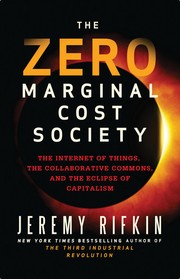Check nearby libraries
Buy this book

The capitalist era is passing -- not quickly, but inevitably. Rising in its wake is a new global collaborative Commons that will fundamentally transform our way of life. Ironically, capitalism's demise is not coming at the hands of hostile external forces. Rather, The Zero Marginal Cost Society argues, capitalism is a victim of its own success. Intense competition across sectors of the economy is forcing the introduction of ever newer technologies. Bestselling author Jeremy Rifkin explains that this competition is boosting productivity to its optimal point where the marginal cost of producing additional units is nearly zero, which makes the product essentially free. In turn, profits are drying up, property ownership is becoming meaningless, and an economy based on scarcity is giving way to an economy of abundance, changing the very nature of society. Rifkin describes how hundreds of millions of people are already transferring parts of their economic lives from capitalist markets to global networked Commons. "Prosumers" are producing their own information, entertainment, green energy, and 3-D printed products at nearly zero marginal cost, and sharing them via social media sites, rentals, redistribution clubs, bartering networks, and cooperatives. Meanwhile, students are enrolling in massive open online courses (MOOCs) that also operate at near-zero marginal cost. And young social entrepreneurs are establishing ecologically sensitive businesses, crowdsourcing capital, and even creating alternative currencies in the new sharable economy. As a result, "exchange value" in the marketplace -- long the bedrock of our economy -- is increasingly being replaced by "use value" on the collaborative Commons. In this new era, identity is less bound to what one owns and more to what one shares. Cooperation replaces self-interest, access trumps ownership, and networking drubs autonomy. Rifkin concludes that while capitalism will be with us for at least the next half century, albeit in an increasingly diminished role, it will no longer be the dominant paradigm. We are, Rifkin says, entering a world beyond markets where we are learning how to live together collaboratively and sustainably in an increasingly interdependent global Commons. - Publisher.
Check nearby libraries
Buy this book

Previews available in: English
Showing 1 featured edition. View all 1 editions?
| Edition | Availability |
|---|---|
|
1
The Zero Marginal Cost Society: the internet of things, the collaborative commons, and the eclipse of capitalism
2014, Palgrave MacMillan, St. Martin's Press
Hardcover
in English
1137278463 9781137278463
|
aaaa
Libraries near you:
WorldCat
|
Book Details
Table of Contents
Edition Notes
Classifications
The Physical Object
ID Numbers
Community Reviews (0)
Feedback?History
- Created August 1, 2014
- 16 revisions
Wikipedia citation
×CloseCopy and paste this code into your Wikipedia page. Need help?
| March 7, 2023 | Edited by MARC Bot | import existing book |
| December 22, 2022 | Edited by MARC Bot | import existing book |
| December 10, 2022 | Edited by ImportBot | import existing book |
| December 7, 2022 | Edited by MARC Bot | import existing book |
| August 1, 2014 | Created by Emma C. Moore | Added new book. |









